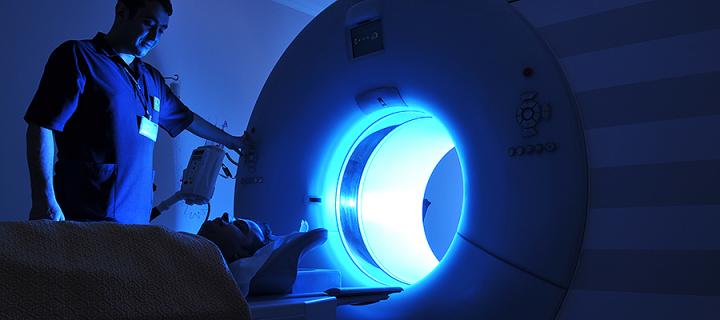£12 Million fund for scientists to perform vital brain cancer research
Scientists are set to receive over £12 million from Cancer Research UK and The Brain Tumour Charity to find new ways to treat brain tumours: June 2019

Professor Steven Pollard and Professor Neil Carragher, both from the Cancer Research UK Edinburgh Centre - a strategic partner of the Institute of Genetics and Molecular Medicine - will lead international consortia of scientists to perform vital research into brain cancer. The teams have been awarded £5.8 million and £6.3 million respectively to support fundamental research and work towards new treatments for the most common type of brain tumour, called glioblastoma.
Every year in Scotland around 1,000 people are diagnosed with brain tumours. And around 470 people in Scotland die from brain tumours every year.
Brain tumours are one of the hardest types of cancer to treat because not enough is known about what starts and drives the disease and there are challenges with translating discoveries in the lab to treatments for patients. This means that survival has barely improved over the last 40 years.
The Cancer Research UK Brain Tumour Award will allow Professor Pollard to lead a team of scientists from the UK, the US and Canada to carry out pioneering research into glioblastoma biology that hasn’t been explored until now. Their goal is to develop new and better ways to treat brain tumours by uncovering new drug targets and treatment strategies that could also prevent brain tumours from returning.
Some glioblastoma cells can evade current treatments such as radiotherapy and chemotherapy. These cells exist in a ‘sleeping’ state that ‘wake up’ after initial cancer treatment and support the tumour to grow again. Professor Pollard and his team will study the mechanisms that control this switch from dormancy to wakefulness.
In addition, the scientists will investigate whether key processes that take place during brain development are also essential for glioblastoma tumours to develop and grow to see if these processes could be targets for new treatments. And they will try to understand why the brain’s immune system fails to do its job and get rid of the abnormal tumour cells.
Treating brain tumours remains a real challenge. They take the lives of far too many people each year.
It’s fantastic to have a big investment like this that will expand brain cancer research at the University of Edinburgh and enable us to work with outstanding UK and international scientists.
We want to deeply explore the cellular processes that glioblastoma depends on to develop and grow. This information is critical if we are to develop newer and better treatments and to stop brain tumours from returning.
The funding will help us build on our existing infrastructure and grow the UK research community. We will be working with many brilliant scientists who don’t normally focus on brain tumour research to help us stimulate new thinking and fresh approaches to tackling brain cancer.
Meanwhile Professor Carragher will work with scientists from the University of Edinburgh, University of Oxford and the Massachusetts Institute of Technology in the United States to identify new drug targets and drug combinations to treat glioblastoma.
They will use several new approaches for testing libraries of drugs on glioblastoma stem cells derived from patient samples that have been characterised by genetic mutations that are driving the disease. The scientists will see how the cancer cells respond to different drug combinations, which could help guide which combinations work best for which type of patient depending on their genetic changes.
The researchers will also look at using tiny particles called nanoparticles, which can help deliver drugs across the blood-brain barrier. This is a membrane that keeps a tight check on anything trying to get in to the brain, including drugs. The blood-brain barrier is a major challenge in developing new treatments for brain tumours.
This substantial funding allows us to make huge strides in finding the best treatment for each patient, giving them a better chance of survival.
We urgently need to develop therapies for brain tumours that tackle treatment resistance and relapse, and with less toxicity for a better quality of life for patients. By addressing these challenges, we hope to improve survival and bring new hope to people with brain tumours and their families.
Related Links:
Professor Neil Carragher website

